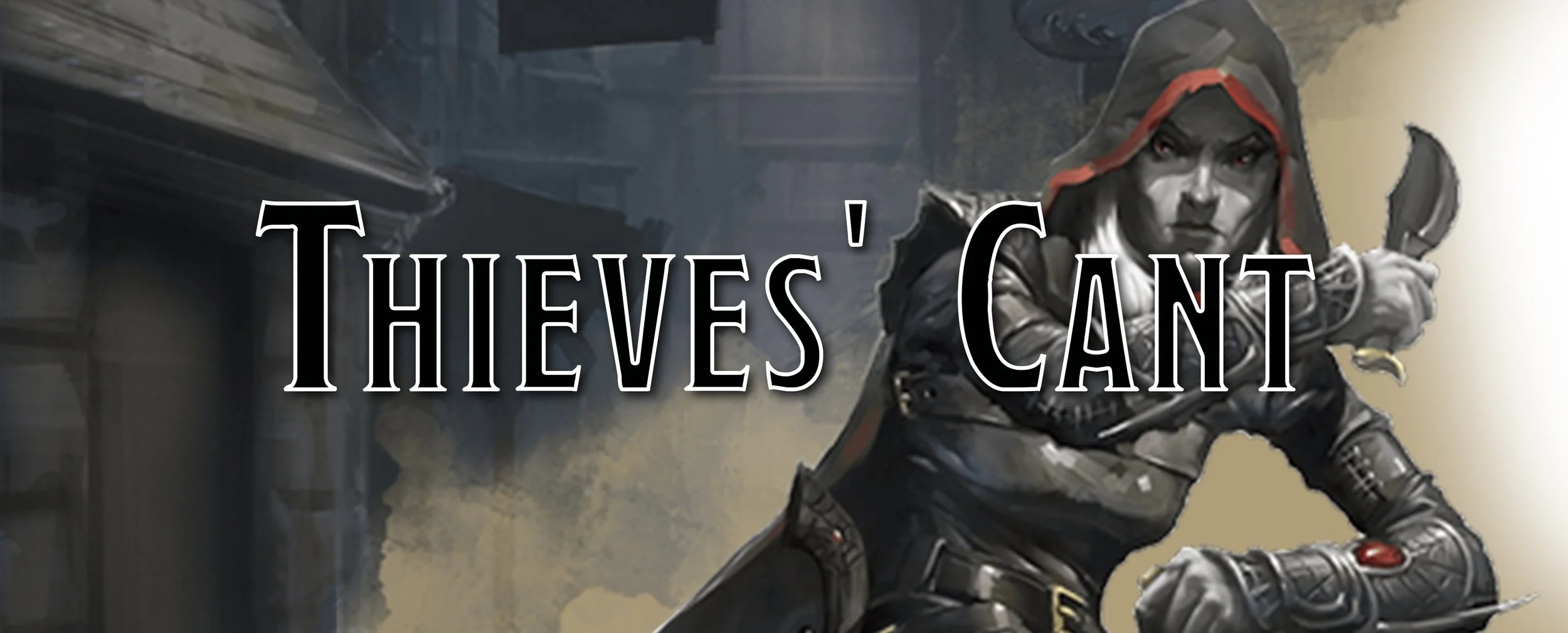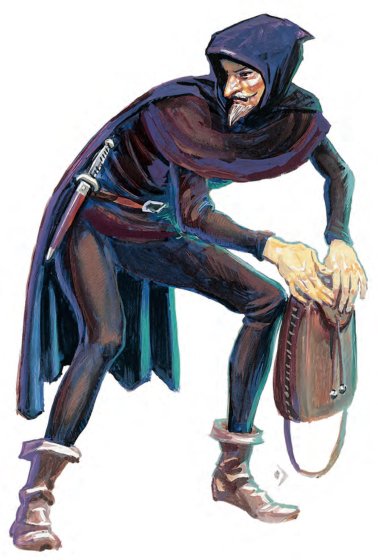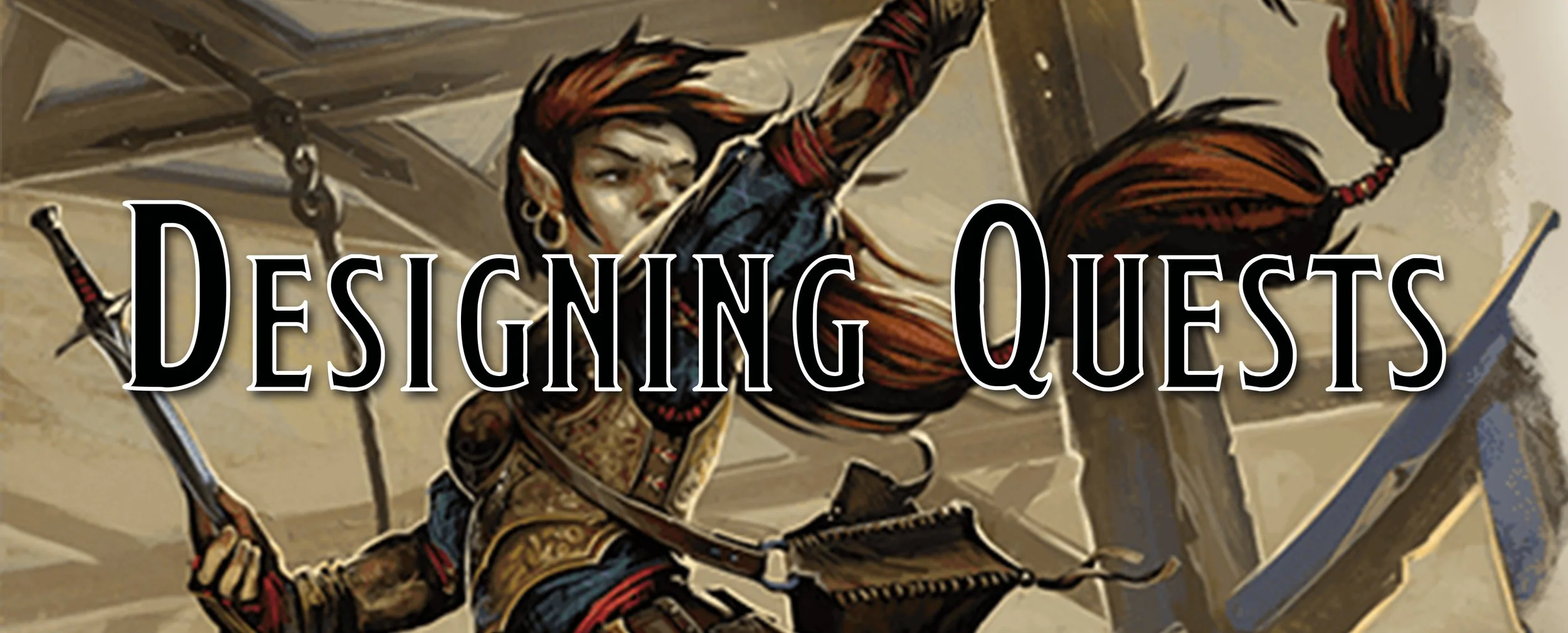What's the Chant with Thieves' Cant?
Header Art: Player’s Handbook (2014) by Wizards of the Coast
For those roguish sorts, Thieves' Cant is an exciting feature they get access to at 1st level. You might be shaking your head at me, thinking that getting a pseudo-secret language isn’t that thrilling and sure, it isn’t quite as exciting as sneak attack or spellcasting, but it’s still pretty cool.
Player’s Handbook, 1989 TSR Inc.
Part of its problem, though, is that at first blush, you probably have no idea what it is. It has something to do with thieves, which is obvious from its name, but what exactly is a cant? For those who don’t know, cant means “to talk hypocritically” (Merriam-Webster) - so basically, you say one thing but mean another. With that understanding of cant, it makes perfect sense why we call it thieves’ cant - rogues say one word, while meaning a completely different one.
This is like modern-day slang, and I’m not about to say something that is immediately going to get me cast as an out-of-touch old guy, I’m slightly smarter than that. You know slang, you’ve heard people use it around you, and sometimes you don’t understand a single thing that someone just told you even though you are one-hundred-percent certain that that person spoke all words that you know.
History
The history of thieves cant is a bit hard to pin down. While we have a starting point around 1530 CE with Samuel Rid claiming it was invented by “cozenings, knaveries and villainies” to hide their illegal activities, we don’t really know if it was truly utilized. In addition, if there were actually thieves’ cant, we don’t know for certain that the words that have been recorded were actually used and not just fiction conjured by an author.
With that said, we can easily see that people and sub-groups commonly make their own slang and jargon that is impenetrable for an outsider to understand without slowing down and explaining what they mean. People who play a lot of Dungeons & Dragons are quick to talk about newbs at the table, bouncing d20s, rolling THAC0, Vancian casting, dump stats, beholders, mind flayers, dungeon masters, min-maxers, powergamers, SAD and MAD, and plenty of other jargon that other people not exposed to this hobby would have no understanding of.
This can also be applied to other cliques and groups, like businessfolk using synergy or how they have a bunch of SMEs which could mean Subject-Matter Experts or Small-to-Medium Enterprises depending on who you are talking to. Of course, with our jargon and business jargon, we can eventually understand what the other person is talking about from context clues.
Thieves’ cant, on the other hand, is speaking in jargon and slang, but dialing it up until you can’t even rely on context clues to help you understand what they are saying.
Using Thieves’ Cant
“Since ya on break, how about a box-top?”
”And the warblers? Give ‘em a bunch of fives?”
”Nah, got a sticker - they lam on mudders.”
”Out of print? I can’t away for gloom bound.”
”The squeak will take ‘em on water life - and you’ll get a couple of tons of crackers. Easy rattle.”
”Alright - meet at The Hour?”
For a translation of the above…
“Since you are out of jail right now, how about you help me rob a place?”
”Are there guards? Do we beat them up?”
”No, I have a killer (specifically one who uses a knife) - they like to go wild/crazy on guards/the watch.”
”Dead? I can’t go to jail for murder.”
”The small creature (typically kobold, gnome, or ratfolk) will take them down to the sewers for disposal - and you will get 2,000 gold pieces. Easy money.”
”Alright - meet you at 2 a.m.?”
As you can see in our example, if you overheard the conversation - you pry couldn’t make sense of what the two individuals are talking about. While you may know a few of the slang above, like ‘lam’, you probably don’t know all of it or be able to put it all together when you overhear it. This is all that thieves’ cant is - jargon and slang that says one thing, but means a completely different thing.
In addition, this jargon and slang is going to be different depending on where you are. In one city in my world, I use “How’s Your Paddle?” as a general greeting that doesn’t mean anything but came about because there is a large canal where a lot of people used to paddle their boats across. This phrase would be completely meaningless outside of that city and in a place, like the desert, where that would hold no meaning for people.
Player’s Options - Heroes of Shadows, 2011 WotC
Thieves’ cant would be a unique ‘language’ in each locale and group, though that does make it rather problematic to GM for if you make it so that players only know thieves’ cant in X and Y city, since they share a similar border, but can’t speak it in Z city even though they have similar jargon but a different cultural undertone for the thieves.
With that said, I’d ignore that part of thieves’ cant and just keep it the same throughout the world to make it easy on you and the table.
Thieves Cant in Dungeons & Dragons
If you’ve ever read or played through Planescape, they have what they call the “Chant”. This is just another type of thieves’ cant, a way of talking when you are traveling the multiverse, though it isn’t restricted to rogues and thieves (though I’m sure they have their own version alongside the Chant). They have such phrases like Bone-Box to describe a mouth (stop rattling your bone-box!), the Dark which means anything that is secretive knowledge (did you get the dark on that tiefling?), and Pike It to mean shut up, get lost, or go away (Shut your mouth and pike it!).
These are inspired by slang from the 16th, 17th, and 18th centuries, largely in England. There are several resources that provide a huge host of slang you can peruse, update, and use in your own games - as well as my list below.
Though, one should take caution when using thieves’ cant - if used too often and too much, it can start to sound silly or the players might get caught up in the weird idioms and words, not able to properly understand what you are saying - which is kind of the point of thieves’ cant but can make it hard to play the game and still take part when the GM is speaking gibberish to you.
Glossary
The following terms are taken from a variety of sources, but many of them are for my own city of Ferrum and can be heard throughout it. If you’d like more information, you can check out our free city guide: Ferrum, the Canal City.
Away To be away means that you are in prison. It is often used by the middle class of Ferrum as a way to avoid admitting that members of their family are criminals. Oh, my husband is away for the month.
All-Fired To mean that you are feeling something very intense or emotional. I went into an all-fired rage seeing him.
Barkers A firearm. More often used to define the makeshift firearms that goblins, rolgu, and kobolds cobble together out of make shift parts. Such scrapped together pieces are quite dangerous to handle and are just as likely to explode as to work properly.
Bind What stops you from doing an activity or action, often in regards to what stops you from robbing someone, like do they have guards or spell protections
Bit Maker Someone who forges currency, typically coins of any denomination.
Blinker A black eye or a hard blow to the eye. Sometimes used when describing someone who is violent and likely to cheat in a sanctioned knuckle fight and go for sensitive parts of the body.
Bonnet A stolen hat, often a fancy, stolen hat.
Box-Top Second-story work, a house to be robbed
Break Someone who is often in prison or jail and is currently out. Ze is on a break, but she’ll be back after that second-story work.
Bunch of Fives To describe someone who fights with their fists or was hit by a fist. He took a bunch of fives to the face.
Canal-ward Instead of providing a specific direction, someone might say canal-ward meaning that you need to head in the direction of the canal.
Cheap A market or set of stalls. Areas within Ferrum might be called Cheapside or Cheap Place, meaning that shopping can be done here.
Clank To describe where a robbery happened or that someone is currently robbing a place. Did you hear of the clank on Maple street? No, I was busy clanking at Pepperidge.
Clanker A robber or thief, especially since they often steal gold or metal objects which clank when they run away from peelers.
Copper Novel These are thin books made up of a dozen or more pages bound with string and typically sold for three copper notes. These novels are easy reads with simple story arcs that are resolved within each issue, and may have full page illustrations to pad it out. The two most popular copper novels are The Sea Awaits, about a dashing half-elf who goes on adventures as a pirate, and Canal Caper, about a young woman who finds out she is the result of a forbidden love within the nobility of Ferrum and her search for love in the city.
Deadlurk An abandoned building or premises, it might be from neglect or something horrible happening to the owner, causing them to disappear.
Dead Rabbit Someone who starts fights or is prone to bursts of violence at sudden times without warning.
Dollshop A brothel or house for sex workers, typically one that is unlicensed or of low quality.
Fakement A falsified government document, typically to show that someone is dead who isn’t or that they own a building that they don’t. Heard that you got busted for a fakement, tough luck on that.
Floorer Used to describe sudden and painful news that ‘floors’ the recipient with its unpleasantness.
Gas-Bag Either in reference to an airship that uses rare gases to help it float or to talk about someone that lies.
Gloom Bound Someone who is going to die soon, often because they made a mistake and have crossed someone important or powerful. Gloom is the name of the plane of shadows where souls go in death before reaching the outer planes. James is gloom bound after insulting Tomas.
Growler A loud machine that just seems to make noise and not much else.
Half-Hour Noble Someone who only acts like a noble or upper class superficially, typically to impress their peers.
Halfling Gallop To move quickly in a crowd, often by someone who is short or can only take short strides due to being in a big crowd. Ol’ Marty is doing the halfling gallop, but ya know how the troll-crossings are.
How’s Your Paddle? An opener for small talk with no real meaning. Typically used for asking how someone is doing though might just be yelled at someone as a cry of greeting. Thought to be started due to the city being built around a canal that once had many boats use oars to paddle across it.
Jump Typically used as a description of a burglary through the ground floor window of a house. Thieves jumped the house on Oakford Street.
Lam To thoroughly beat up someone, often for money. The Bloodied Hand went lam on the tavern keeper.
Life Sentence To announce someone is married. Heard she got a life sentence with that drunkard.
Long-Tailed Used by rolgu (ratfolk) to describe someone important
Lushery A place to get drunk at, often a tavern.
Mister Hammerling A derogatory term for an executioner. It is often used to describe an executioner who lacks finesse in their duties and simply brute force executions. Mister Hammerling, how about you do your job?
Mudders A nickname for the Ferrum Watch, specifically those that patrol the poorer areas. So named because their uniforms are brown with gold, and often covered in dirt from the poor quality streets.
Mugger A thief, often one who does it in public. They commit ‘muggings’ or they ‘mug’ people.
Nose A spy or informant
Out of Print Coined by booksellers to describe someone who died.
Part-Time A job, more specifically, a job that is a crime
Peeler Members of the Ferrum Watch
Play the Wheel Common slang among executioners about using a Breaking Wheel when executing someone. I played the wheel with a rogue who stole from some nobles.
Plow A term for having sex. He was plowing the wrong fields last night, got caught by her husband.
Pointed Noses Nobles or royalty, or those who act like such, This term is given the name because they point their nose up and refuse to look at lower classes, they might even hold their nose up and pinch it when walking through poorer areas due to the smell.
Railing To ride the elemental rail line or someone who goes on for too long when talking about something.
Rattling Pockets / Pockets to Rattle They have a lot of money on them or that they are rich, or at least, they want to have a lot of money.
Raw A bare knuckle fight or bare knuckle fighter.
Sakhran Used to describe someone who brags about having a lot of money but is actually penniless. They are often said that they belong to the Sakhran family in reference to the Sakhra family who is the wealthiest family in the city.
Second-Story Work To either describe someone breaking into a house, often through a second-story window, or someone whose main occupation is thievery. Utgar is a second-story worker, just not a good one.
Share Some Land As the currency for copper, silver, gold, and platinum notes are decorated with the different landmasses of Talia, the notes are often called land. Those who ask to share some land are asking for a gift of money. Trevor needs to stop sharing land with Bitl.
Shipwrecked To describe someone who is passed out and drunk, typically still while they are in the bar or tavern.
Sloper To describe someone whose nose is constantly running, often from severe allergies or are very sick.
Spell-Slinger Someone who casts spells, more specifically, someone who casts spells directed at another with little provocation or to hurt and maim. Tried to mug that old man, turns out they a spell-slinger and lit the street a’fire.
Squeak A small creature, most often in reference to the rolgu (ratfolk) though can be used to describe a kobold, gnome, or other creature with a higher pitched voice.
Sticker Someone who has stabbed a lot of people with a knife. Samara got arrested for being a sticker.
The Hour A specific time - always 2 a.m. When meeting up before or after then, you specify how many hours before or after. We meeting two before The Hour or two after The Hour?
Tinker Toys Stolen magic items.
Tons of Crackers One thousand gold pieces
Toy A magic item that produces a lot of flash and smoke, but doesn’t necessarily do a lot. Magic items are often called toys if they are counterfeits of real magic items. Where’s your new ring at? Turned out the protection ring was just a toy.
Toy Runner Someone who specializes in selling magic items, often counterfeit magic items. Thought to be called runner because they often have to run from outraged customers.
Troll-Crossing A name for the bridges in the city, taken from the fairytale about a troll guarding a bridge.
Warbler A Ferrum Watch member who uses their whistle too much or communicates with other Watch members with their whistle. Often directed at inconsiderate Watch members who use their whistle at night for no reason.
Water Life Someone who was found dead floating on the canal or in the sewers. Old Mags has begun her water life.
Wet Whistle When you want to get something to drink. In reference to you whistling for the bartender to get you another drink.
Like what we are doing here?
Support us on Patreon!
You’ll get early access to deep dives, the Homebrew Hoard featuring 500+ monsters, Monster Thursdays, ad-free articles, and more!
Follow us on Twitter to keep up to date on everything we talk about!





